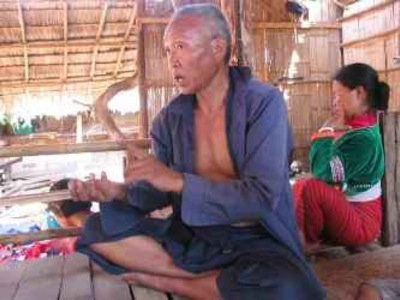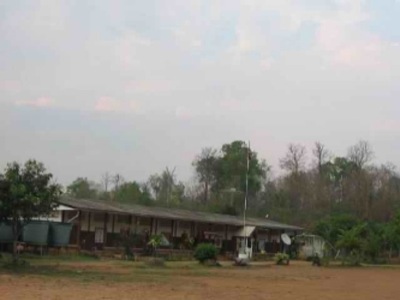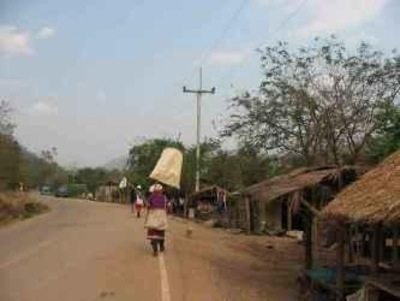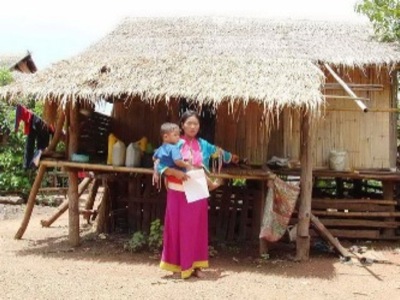By Pu Chiangdao
Photo : Ongart Decha, Anuparb Nunsong
3. A long and dangerous journey to Pangdaeng
The journey the Pangdaeng Palaung took was long and dangerous, from their old villages in Burma’s Shan state across forests, rivers and mountains before reaching the Thai border.
“Why move from Ban Nor lae (in Fang district) to Pangdaeng?”
“In Nor Lae up Ang Khang mountain, there wasn’t enough farm land. We grew rice but got no crops. The weather up there is too cold…”
An elderly Palaung man told me that it was not safe for villagers to stay any longer at Ban Nor Lae. The village is located close to the Thai-Burma border where fighting between Khun Sa’s Shan army and Burmese soldiers was rife. The Shan army often forced villagers to grow poppies and work in the rice fields. They also took away villagers’ rice crops. So villagers didn’t want to stay at Ban Nor Lae. Before the Palaung, several ethnic groups had settled in the area around Mae Tor-Huay E Go river. The Akha, who moved there after the Lisu, had bought lands from the Lisu to build houses and to grow rice and corn and to raise cattle. The Lisu meanwhile worked the lands of the northern Khon Muang people.
The Palaung villagers who had moved from Ban Nor Lae worked in the tea plantations in nearby Ban Mae Jon. They saved some money and later bought about 10 rai of lands from the Khon Muang villagers to settle at Ban Pangdaeng Nai. Their early settlers’ neighbours were Khon Muang, Karen and Lisu. There were then about 12 households of the Palaung villagers.

Uncle Inphrom Jongtan, Palaung elder, recounts his story.
Later, due to the Royal Forestry Department’s reforestation plan in the area of Pangdaeng, more Palaung villagers from Ban Nor Lae and other villages in nearby Chai Prakan district were relocated and hired as cheap labour in the reforestation project. They were not sent back to their former settlements and have since stayed at Ban Pangdaeng Nok, not knowing where else to go.
The only school in the area, Pangdaeng Primary School, was later built by the Nong Hor Buddhidharm Foundation. The school was transferred to the state later. Villagers hope that their children will learn the Thai language and get accustomed to the Thai way of life. Indeed, many who have learnt about Palaung life couldn’t help appreciate their simple living in harmony with nature.

Pangdaeng Primary School, where the Thai state provides education to the community through government teachers. The villagers were accused of deforestation.
Winds of change, village enclosed by state natural resource policy
When the village dirt road was transformed into a concrete road, cutting through Ban Pangdaeng Nok to Ban Palai-Huay E Go, some villagers were happy that their village would be developed like those of the Khon Muang. What the villagers didn’t know was that the road was built by investors who want to make profits from the limestone mining in the area. After the road came land speculation, extension of agricultural land, illegal logging and increasing forest tours.

The paved road passes through the village for other benefits. There are electricity poles but no one is allowed to use the electricity.
Villagers recalled that illegal logging by outsiders rose during 1987-1989. Vast areas of forests had been opened in response to the policy by the Chatchai Choonhavan administration which emphasised economic growth as a key to national development. Moreover, land reform policy, initially planned to help the poor, had been exploited by politicians and local and national influential groups for their own interests. Through their influence, these forest exploiters had encroached on the forest and applied for title deeds on forest land.
“Some of the influential local people, no need to name names, became millionaires during the Chatchai administration,” said Nikhom Puttha, an environmentalist working to conserve the Upper Ping river basin.
This competition for natural resources took place while Pangdaeng villagers continued living their simple lives in harmony with the natural environment. Their houses are still made of bamboo in which several families live. Some huts house 8-10 people. Wage labour continues to be villagers’ main source of income.
Rising worldwide interest in natural resources conservation together with strong opposition to the state’s forest management policy, which had failed to prevent forest exploitation by investors, eventually led to the policy to “close” the forest in 1989.

Pangdaeng: victim of the violence of the new state forest policy
The new forest policy, which aimed to conserve the remaining forests, saw local authorities resorting to harsher measures in punishing forest encroachers. As a result, forest dwellers all over the country were arrested and charged with forest encroachment despite the fact that in several areas, villagers had long resided in the areas before the state declared the forest conservation status.
Pangdaeng is one of the scapegoats of the new forest policy. While ethnic villagers have often been arrested by authorities, the influential and investors – the real perpetrators, remain unscathed.
“Illegal Palaung aliens arrested!!...”
“Mr Sompong Anukul, Chiang Mai Forestry Chief, together with police and forestry officials, arrested 34 Palaung men on January 26. The Palaung hill tribe with Burmese nationality had illegally migrated into the Chiang Dao Forest Reserve and had encroached on and destroyed forests.”
(Thai News newspaper, Jan 31, 1989)
That was the first tragedy of Pangdaeng villagers who became scapegoats on the charge they knew nothing about. Of the villagers arrested, 29 were Palaung and 3 were Lisu.
The Pangdaeng villagers recall:
“It was about 5.30 in the morning, some villagers had just got up. Women woke up first to pound rice. In the dark, the rice-pounding was heard. Then, about 100 police in uniform and plain clothes as well as a hundred forest officials surrounded the village. They came in 17 pick-up trucks. The officials walked into the centre of the village and ordered all the men to gather there. We were told there would be a meeting that the district chief would attend…”
“…Altogether there were 41 men. Officials let the elderly go and took 29 men. They said they would be taken to the district office to get Thai ID cards. Some officials said the villagers were being taken to receive free blankets. Many were happy and followed the officials. The officials told their relatives that the men would be sent back home later at night, not to worry…”
“When we arrived in Chiang Dao, the officials did not take us to the district office but to some other place and we waited there until dark. Then we were taken to the police station and charged with forest encroachment. We denied the charge. We said our village was a former settlement of the Khon Muang and that we had paid for the lands we now live on”
“We said every place where Palaung work or farm, we had already paid for the cutting. We had never encroached on land. However, the officials told us that the lands had no title deeds. After that, we were put into jail…”
The villagers were jailed in Chiang Dao police station for seven days before being transferred to Chiang Mai Prison. They went to court and then were put in prison again. No one knows their fate.
“In court, we were told if we confess, we will get out quick. If not, we will have to serve the jail term of 11 years and nine months. If we confess, this will be reduced by half. We didn’t know anything. We only wanted to get out so when they told us to do anything, we just went along.”
“When the day came when we were convicted, all of us burst into tears. Some couldn’t stand, some fainted. We were chained and had to wear prison clothes. The first day in the prison, I couldn’t sleep. One day in prison was like a month to me”
Translated by Mukdawan Sakboon
Read More:
- Pangdaeng... repeated nightmare (1)
- Pangdaeng... repeated nightmare (2)
Prachatai English is an independent, non-profit news outlet committed to covering underreported issues in Thailand, especially about democratization and human rights, despite pressure from the authorities. Your support will ensure that we stay a professional media source and be able to meet the challenges and deliver in-depth reporting.
• Simple steps to support Prachatai English
1. Bank transfer to account “โครงการหนังสือพิมพ์อินเทอร์เน็ต ประชาไท” or “Prachatai Online Newspaper” 091-0-21689-4, Krungthai Bank
2. Or, Transfer money via Paypal, to e-mail address: [email protected], please leave a comment on the transaction as “For Prachatai English”
